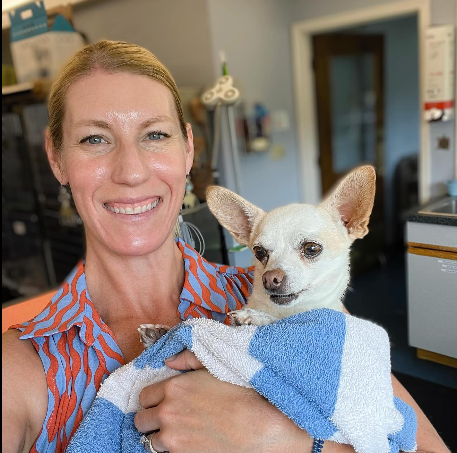The Snickerdoodle is a relatively new hybrid dog breed that has been gaining popularity over the past few years. This cute cross between a Miniature Schnauzer and a Poodle produces a dog with tons of personality packed into a petite frame.
With their endearing looks, friendly nature, intelligence, and moderate activity needs, Snickerdoodles make excellent companions for all types of owners. Read on to learn more about this delightful hybrid dog.
Origin
While the exact origins of the Snickerdoodle dog are unclear, this crossbreed is believed to have first been developed in the 1990s or early 2000s in North America. The breeding of a Mini Schnauzer and a Toy or Miniature Poodle produced tiny pups with the best traits of both parent breeds.
The hybrid was likely named “Snickerdoodle” after the sweet cinnamon-sugar cookie due to its cute appearance and sweet personality. The little dogs soon charmed their way into the hearts of dog lovers, and the Snickerdoodle’s popularity as a companion pet took off.
Appearance
The Snickerdoodle is a very small dog, usually reaching between 7-12 inches tall at the shoulder and weighing 8-15 pounds when fully grown. It has a sturdy, square body frame covered in a dense, wiry coat reminiscent of the Schnauzer. Common coat colors include salt & pepper, black, brown, white, and apricot.
These dogs have an adorably scruffy appearance with a beard and eyebrows that give them plenty of personality. Their expressive eyes are one of their most endearing physical traits. Snickerdoodle pups strongly resemble little fluffy owls!
Over time, Snickerdoodle breeders have worked to produce puppies that meet the American Kennel Club’s breed standards for both the Miniature Schnauzer and Poodle. While the AKC does not currently recognize the Snickerdoodle itself as a standardized breed, these hybrids make wonderful pets.
Temperament
One of the reasons that Snickerdoodle dogs have become so popular is their winning personality. They are bright, energetic, friendly, and loyal little companions. Snickerdoodles form very close bonds with their owners and aim to please. They are often described as being delightful lap dogs due to their affectionate natures.
These little dogs tend to get along very well with other pets and children in the home, especially if they are socialized early on. Snickerdoodles are clever and energetic enough to enjoy playing games with kids for hours. Supervision is still recommended anytime dogs interact with tiny children, however.
While generally trusting with their own families, Snickerdoodles can be wary around strangers. Their alert natures make them excellent watchdogs who will enthusiastically announce visitors and unusual noises. But this breed is far too small to work as an actual guard dog.
With their crossbred hybrid vigor, Snickerdoodles tend to have wonderfully balanced personalities. They are the perfect cuddle buddies at home yet still love to run around outside or learn new tricks. Early socialization and training will ensure these dogs grow into happy, friendly companions.
Grooming & Care
One of the Snickerdoodle’s most appealing traits as a pet is their relatively low-maintenance coat. While Poodles require intensive regular grooming, this crossbreed has a less demanding wiry fur. Snickerdoodles hardly shed, making them a great choice for those with allergies.
These petite pups only need occasional brushing and bathing to keep their unique coats looking tidy. Trim the fur around the eyes and paws as needed to prevent debris buildup. Their beards may also require some tidying up. Always use grooming products specifically formulated for dogs with wire hair coats.
In addition to grooming, be sure to clip your Snickerdoodle’s nails monthly and brush their teeth weekly. Check and clean their ears of excess wax buildup too. Keeping up with these basic care tasks will help keep your hybrid pup looking and feeling their very best.
Despite their small size, Snickerdoodles have plenty of energy to burn. They should get at least 30-60 minutes of vigorous exercise daily. Taking these dogs on walks, runs, hikes, or letting them play fetch in a fenced yard are great ways to keep them fit and stimulated.
Puzzle toys and training classes provide mental stimulation as well, which is key for these bright little pooches. If left alone for long periods or allowed to get bored, Snickerdoodles may resort to nuisance barking or undesirable behaviors. So be sure to give them adequate outlets for all that hybrid vigor!
With their moderate activity needs, Snickerdoodles are versatile dogs who can thrive in urban apartments or larger homes. Just be aware that their watchdog tendencies include some barking, which your neighbors may not appreciate! Providing proper exercise and stimulation is key to having a happy, healthy pup.
As far as healthcare, Snickerdoodles are at risk for the same genetic conditions as Schnauzers and Poodles. These include luxating patellas, eye issues, skin allergies, and dental problems. Reputable breeders screen their breeding dogs.
Feed your Snickerdoodle high-quality kibble formulated specifically for small or toy breeds. Limit treats and be vigilant about what they put in their clever little mouths on walks. Keep up with routine vet checkups to catch any potential inherited issues early.
With excellent preventative care and early health screening, Snickerdoodles typically enjoy lifespans of 13-15 years. Keeping your pup fit, providing nutritious food, staying up to date on vaccines, and managing vet care are all important for supporting your dog’s wellbeing.
Training
Snickerdoodles are very bright, alert dogs that thrive when given plenty of mental stimulation. This makes them highly trainable using positive reinforcement techniques. Keep training sessions short and fun for these petite pups. Food rewards, praise, and play motivate them wonderfully.
While eager to please, these crossbreeds can have a bit of typical terrier stubbornness thanks to their Schnauzer lineage. Establishing yourself as a kind, consistent pack leader is key to success. Group or private training classes provide helpful socialization during the crucial first year as well.
Putting in the work on early obedience helps set clear expectations for polite behavior. With their energetic natures, Snickerdoodles certainly benefit from learning skills like “wait” and “leave it” as youngsters! Practice at home along with formal training helps reinforce good manners.
Snickerdoodles are such clever little dogs that they tend to excel at all types of canine sports. Agility courses allow them to put all that hybrid vigor to work navigating obstacles and challenges. Their high trainability also helps them perform well at nose work, barn hunts, obedience trials, and more.
Of course, you don’t have to enroll your Snickerdoodle in organized events for them to be happy. Simply teaching fun tricks like fetching slippers or ringing bells keeps these dogs mentally and physically stimulated. Learning new things is a reward in itself for this bright breed!
Pros & Cons of Snickerdoodle Dogs
If you’re considering adding one of these petite hybrid dogs to your family, be sure to reflect on both the positives and potential challenges. No breed is right for everyone, so take your lifestyle and experience into account when making such an important decision.
Pros:
– Small size perfect for apartments
– Affectionate, friendly personality
– Get along well with other pets
– Shed very little with low dander
– Eager to please and highly trainable
– Fun-loving energy perfect for active owners
Cons:
– Prone to nuisance barking & separation anxiety
– Can be difficult to house train
– Need plenty of daily physical and mental exercise
– May display terrier stubbornness during training
– Grooming is low maintenance but still necessary
– At risk for certain health issues like their parent breeds
As you can see, Snickerdoodles make wonderful pets for the right owners. Just be realistic about the level of responsibility caring for dogs requires before committing to this crossbreed – or any dog.
Where to Adopt or Buy a Snickerdoodle
Due to their increasing popularity over the past decade or so, it’s not difficult to find reputable Snickerdoodle dog breeders these days. Prices often start around $800 and up. Be wary of any breeders advertising these hybrids at unusually low prices, however, as that may indicate questionable breeding practices.
Thoroughly vet any potential breeders to ensure they use health tested parent dogs and raise puppies humanely. Ask lots of questions and request proof of health clearances. Never support unethical puppy mills just to save money up front.
Adopting a Snickerdoodle through your local shelter or rescue group is another option. Pet adoption fees are usually under $200. The mix of breeds at shelters means adopted dogs are often one-of-a-kind.
Just be aware that adopting an adult dog includes some uncertainty regarding their history and temperament. If going the adoption route, ask questions about the individual dog’s needs to ensure they will thrive in your home.
The Perfect Pet for the Right Person
In summary, the Snickerdoodle is one of the most endearing hybrid breeds available nowadays. Their tiny size combined with their fun-loving personalities makes them an ideal pet for urban dwellers or active singles/couples. These petite pooches do require plenty of exercise and mental stimulation, however.
Snickerdoodles are highly trainable and eager to please, although some terrier-like stubbornness can manifest at times too. With early socialization and consistent training, they truly shine as bright and affectionate little companions. Their minimal grooming needs are a bonus as well.
Just be sure you can meet this active breed’s needs for daily activity and attention before welcoming one home. When properly exercised, loved, and cared for, the Snickerdoodle dog makes a delightful lifelong furry friend!

Dr. Allison Kramer is a seasoned veterinarian with a Master’s degree in Animal Behavior and over 10 years of experience specializing in canine health and behavior. Her expertise in positive reinforcement training and holistic care enhances the well-being of dogs and fosters strong pet-owner relationships. For expert advice and valuable insights, follow Dr. Kramer on Instagram @dr.allisonkramer.




